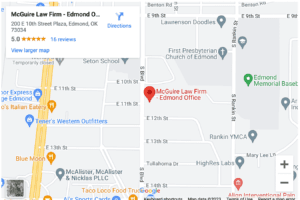Strict Liability Lawyer in Oklahoma City

Personal injury is defined as harm to a person’s body, emotions, or mind. Personal injury law provides a legal means for injury victims to seek compensation for damages.
An accident victim may file a personal injury lawsuit seeking compensation for non-economic damages and economic damages.
Examples of situations that could give rise to a personal injury claim include, but are not limited to:
- Automobile accidents
- Injuries by wild animals at a zoo
- Accidents involving defective products
- Medical malpractice claims
- Statutory rape, assault, and some other subject to criminal law
- Recreational and sports activities
- Nursing home abuse
- Premises liability claims
Most personal injury claims are based on negligence. However, some personal injury cases could involve allegations of strict liability.
Three Types of Personal Injury Cases
Personal injury cases can be sorted into three types.
Negligence
Negligence claims require that you prove the defendant:
- Owed you a duty of care
- Breached the duty of care
- The breach caused your injury
- You sustained damages because of the breach and injury
The case involves proving that the party did not act with the same level of care as a person of ordinary reasonableness and prudence would have acted in a similar situation. Traffic accidents and slip and fall accidents are examples of negligence claims.
Intentional Injuries
These cases involve someone intentionally engaging in an activity they knew or should have known would result in an injury. Assault, battery, or aiming a loaded firearm at someone are all cases that may fall under this category. Some individuals could be arrested for causing intentional injuries if their actions break the law.
However, a criminal action is separate and apart from any civil claim that a person might have for an intentional injury. You will still need to prove negligence as a basis for intentional tort cases.
Strict Liability
Strict liability holds parties accountable for loss or harm caused by their actions. However, strict liability laws do not require the plaintiff to prove that the defendant was negligent or committed intentional wrongdoing. The law of strict liability means that a defendant can be held strictly liable for an injury without the need to prove fault or intent.
When Does Strict Liability Apply in Personal Injury Cases?
There are three basic types of personal injury cases where strict liability may apply:
Products Liability
Product liability cases are common personal injury cases involving strict liability. There is no need to prove that the manufacturer intended to injure someone or was negligent. The fact that the product was defective and caused an injury is sufficient to assert absolute liability.
Product liability cases may involve a design defect or a manufacturing defect. It can also center around a failure to provide adequate warnings or instructions for use.
Animal Attacks and Dog Bites
Oklahoma laws hold dog owners and animal owners strictly liable for attacks and dog bites. The owner is automatically liable for damages caused by their dog or other animal when it bites or attacks without provocation.
Other parties could be liable under negligence laws, if that party owed the victim a duty of care. However, owners remain strictly liable for damages.
Abnormally or Inherently Dangerous Activities
Strict liability also applies in cases involving abnormally dangerous activities or inherently dangerous activities. The cases involve an activity that carries a substantial risk of injury to the person involved in the activity and other individuals. For example, transporters of hazardous materials are under strict liability for damages caused by injuries or accidents.
In a case involving inherently dangerous activities, the plaintiff would need to show that the defendant engaged in the activity, that the plaintiff was harmed, and the activity was a substantial factor in causing the harm. The plaintiff must also prove that the harm sustained would be harm that could reasonably be anticipated due to the risk created by the activity.
Strict Liability Can Also Relate to Criminal Matters
Individuals can be held liable for damages in strict liability crimes regardless of the person’s intent or mental state (mens rea) when he committed the act. The defendant’s activity is the key to the case. Statutory rape and selling alcohol to minors are examples of strict liability crimes. A person could be held strictly liable for damages for statutory rape even if the person thought the other person was of age and the sex was consensual.
The law states sex with a minor is illegal. Likewise, a person can be guilty of selling alcohol to a minor even if the minor had a fake ID and the person thought the minor was over 21 years of age.
Contact Our Oklahoma Personal Injury Lawyer for a Free Consultation
Deciding whether strict liability applies in a case can be complicated. Our attorneys conduct a thorough investigation and law review to determine if you have a claim under strict liability. Call our office now for your free consultation with an Oklahoma personal injury attorney.

